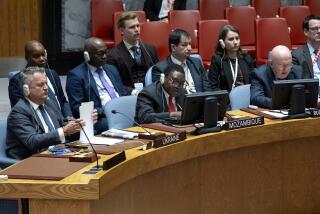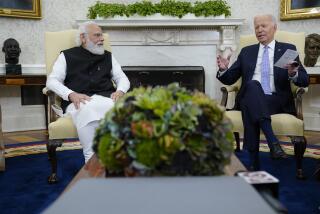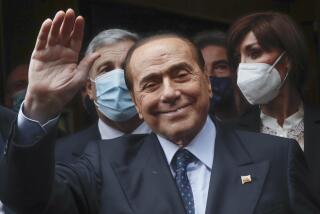Arrivederci, democracy
THIS WEEK, Russia assumed the presidency of the most prestigious club of the world’s leading industrial democracies. But many are questioning not only Russia’s fitness to serve as chair but even its qualification for membership in the Group of 8. China, for example, has not been invited to join this group, despite the fact that it has the second-largest economy in the world in purchasing-power parity (third at dollar exchange rates), because it fails the test of democracy.
Russia’s backsliding from democracy moved Sens. John McCain (R-Ariz.) and Joe Lieberman (D-Conn.) to introduce legislation urging President Bush to suspend Russia from the G-8 until President Vladimir V. Putin’s government “ends its assault on democracy and political freedom.” They point to its lack of adherence to the rule of law, its suppression of independent media and its stifling of the political opposition, among other problems. Their resolution asserts that Russia fails to meet the minimum standards of democratic rule “that characterize every other member of the G-8.”
The senators’ challenge deserves serious consideration. As we stop and reflect, we should ask:
* Can a state ruled by the nation’s wealthiest individual, whose scores of private enterprises depend centrally on state favors, be a member of the G-8?
* Can a state whose leader personally controls all the national television channels legitimately qualify for membership in a club of democracies?
* Should a state whose leader rewrites laws to save himself and his friends from prosecution on corruption charges pass the test on democracy and the rule of law?
* Can a state whose leader forces through changes to the constitution to benefit his party before upcoming elections properly sit at the table alongside Britain, France and the U.S.?
By this point, most readers will suspect that the nation referred to in these questions is not Russia -- it is Italy.
Since he was elected prime minister for a second term in 2001, Silvio Berlusconi has reversed many of the reforms of the early 1990s that were designed to ensure a stable democratic government and restrain corruption. In an effort to save his own party’s majority in parliament, Berlusconi recently reversed landmark electoral reforms and restored a proportional voting system, which previously resulted in an unprecedented rate of government turnover and inefficiency.
He has nullified laws that made anticorruption prosecutions possible, which led to an increase in organized crime. He continues to push laws through the parliament that clear him and his business partners of charges of false accounting, bribery and other felonies.
Moreover, Berlusconi effectively controls 90% of national television broadcasting. He owns three networks and has indirect control over public broadcasting through his ability to influence the choice of the management at these stations. In its 2003 freedom of the press survey, Freedom House downgraded Italy’s ranking from “free” to “partly free,” where it remains today.
A leading authority on Italian politics, professor Giovanni Sartori, recently summarized the matter: “Berlusconi has governed strictly from a cost-benefit analysis of how he can serve himself. By his calculation, his job showed results.”
McCain and Lieberman are right in sounding the alarm about the Putin government’s assault on democracy in Russia. To recognize Berlusconi’s excesses, however, is not to excuse Putin’s. But if the McCain-Lieberman criteria are to be applied, then the U.S. should not excuse a member of the European Union while accusing a former member of the Soviet Union.
More to Read
Sign up for Essential California
The most important California stories and recommendations in your inbox every morning.
You may occasionally receive promotional content from the Los Angeles Times.










